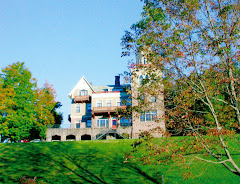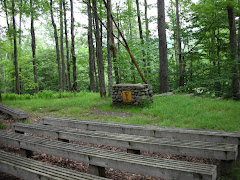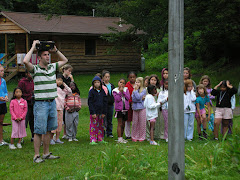Pete used that road--we all experience it, coming to the valley and then sadly leaving it, that pattern of coming and going that almost always has an emotional resonance--as a metaphor for the Frost Valley spirit and for the whole problem of coming home again.
It was far and away the most poetic and coherently arranged speech of the evening and--I worked with Pete a long time--the most beautiful thing I ever heard him say.
Coming back up the road, just to attend the centennial reunion, was hard enough for Pete, who had left Frost Valley a few years earlier (he and Claudia and the boys moved to Camp Fuller in Rhode Island). It was a complex homecoming. It's never easy to come back. You can't go home again is how the mind protests such a return. Yet the theme of the weekend was Finding the Way Back and so indeed did Pete find his way back.
And that, folks, was the very idea and metaphor of his prose-poem. To talk about the very problem we'd all had getting there, to this place. We were older and what we'd done and had and loved there was surely gone. So what remained? Pete, not a religious man, nonetheless offered an answer to the question: the Frost Valley spirit. We've all come down the road, a knot in our stomachs, and then after a time we can't imagine ever leaving. It's the road less traveled, even though it is so often traveled. But on the model of Halbe Brown's coming in 1966, literally walking into trouble, we all were willing to make the hard journey in. Then out. And now back in.
 I had asked Pete to give his talk just before the final song ("Gambler"--see the previous entry) and it would be the last speech before Halbe's. Pete knew what he was being asked to do. To speak very, very personally and at the same time to speak for all of us. He did it. He did precisely that. It's remarkable.
I had asked Pete to give his talk just before the final song ("Gambler"--see the previous entry) and it would be the last speech before Halbe's. Pete knew what he was being asked to do. To speak very, very personally and at the same time to speak for all of us. He did it. He did precisely that. It's remarkable.And I think the speech was memorized. He had no notes and he had his eyes closed the entire time saying it - reciting it from his head/heart, I think. I took a photo of this and so here, fortunately, I don't have to use a photograph from the videotape.
For some of you it would have been as a young camper, maybe 9 years old, in the back of your parents' car, the trunk as big as you next to you, and a knot in your stomach as big as that trunk. And as you turned down the road, and as the trees arched over and it got very dark, you probably wondered if your parents still loved you, and why they were sending you to this godforsaken place. And then before you knew it the road opened up into a beautiful valley, and there were horses on your righthand side and a ballfield on your lefthand side. And in two or three days that knot had almost disappeared--still there, a little bit. But in two weeks when you left, you cried. And the spirit of Frost Valley was in you.
For others of you, you were probably 19, 20, fresh out of the first year of college. And as you turned down the road, you remembered that you'd read all the literature that the camp director had sent you, and you'd spent maybe 45 minutes on the phone with him, but he had never told you about this road. And you are getting farther and farther away from your boyfriend, and closer and closer to 8 13-year-old girls. And you had no idea whether they would respect you or listen to you or like you. But at the end of every session, you cried, because you realized that you had changed their lives, and when the staff left at the end of the summer you cried even more. And the Frost Valley spirit was in you.
Or maybe you were a 25-year-old itinerant cross-country ski instructor and ranger. And your interview had sounded something like this...: "Can you cross-country ski?" "Passably well." "Can you ride a snowmobile?" "Yeah, passably well." "Oh, then you'd be a great cross-country ski director." And you down the road, with a huge knot in your stomach, and you thought, "I can't do this job. This is crazy." In a month you realized, yeah, that you probably could. But two weeks later, at 5 o'oclock in the morning, you're standing on a hill looking at a beautiful dining hall, burning to the ground, mozzeralla sizzling and Number 10 cans popping, and the knot in your stomach returned in a big way, and you're thinking, "I'm out of work." Three weeks later, after people had worked harder than you'd ever seen anyone work in your life, the spirit was in you.
Possibly--well, one of you anyway--was a young rube out of Youngstown, Ohio, still wet behind the ears, taking a job in New York which you knew nothing about. And I'm sure that as you turned down the road, Halbe, the knot in your stomach must have been huge. You had your family in tow, and you got to the camp and it was in debt, half the staff had to be fired, and I'm sure that knot returned many, many times, as the dining hall burned down, as Eugena died in a car accident, and every October when you would panic about the budget. But we never saw that knot, Halbe, because the spirit was in you always. And the trip down the road may have lots of meanings for people. Sometimes a little bit like Jack Kerouac, I'm sure we were all a little bit loose, traveling on. And certainly like Robert Frost, it was definitely the road less travelled, and for all of us it has made a huge difference....
So here it is, the recording of Peter Swain's "The Road".











